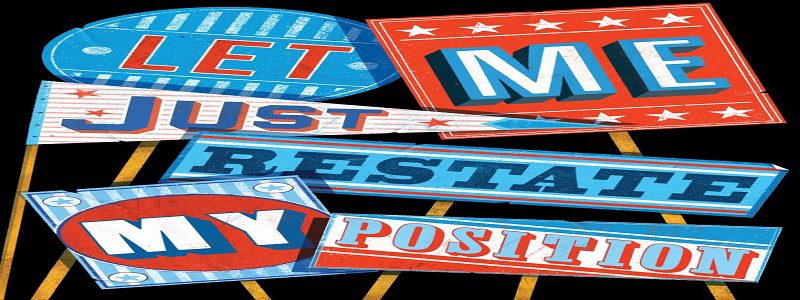
The Ultra-High Stakes of Debates
How to argue is something people are taught. . . . It’s something you can get better at, with practice. . . . For centuries, learning how to argue was the centerpiece of a liberal-arts education. (Malcolm X studied debate while he was in prison. “Once my feet got wet,” he said, “I was gone on debating.”) Etymologically and historically, the artes liberales are the arts acquired by people who are free, or liber. Debating, like voting, is a way for people to disagree without hitting one another or going to war: it’s the key to every institution that makes civic life possible, from courts to legislatures. Without debate, there can be no self-government. The United States is the product of debate.
— Jill Lepore, professor of history, Harvard University, New Yorker, September 19, 2016
We are now a couple days away from the first debate of the 2016 Presidential general election campaign. Some media commentators are expecting it to be one of the highest-rated broadcasts in television history. By virtue of the stakes and the drama they (and the media moths-to-flame) generate, the first debate on September 26th (and the two presidential debates to follow, on October 9 and October 19) will afford an exceptionally powerful opportunity for civic and argument-based education, and Argument-Centered Education will be taking advantage of it with curricular resources and activities built for the debates. It also has the potential to alter the course of the presidential race, and therefore of American history. The United States is, as Professor Lepore writes, the product of debate — historically and presently.
No one knows exactly what is going to happen on Monday night, or in the two October debates, but that of course has only spurred, not stinted, the pre-debate commentary and analysis. Some of it is illuminating and perspicacious, some of it is errant and uncomprehending of debate’s essentials. Lepore’s essay in the New Yorker is a cogent and concise history of presidential electoral debating over the past 60 years, with a sprinkling of sharp analysis about some of the factors leading the debates to be more “dueling press conference” or “verbal food fight,” and less Abraham Lincoln vs. Stephen Douglas intellectual contests of oration and political wisdom set in sunny bowers.
But, while she is much more right than wrong in the piece, Lepore does misstep on a couple of fairly important points. She critiques PBS’s new debating show “Point Taken” with a short, sharp blade —
— stating that the program’s Achilles heel is that “it wants everyone to be nice,” an anti-confrontational ethos related to a prevailing cultural mannerism among the educated elite (outside of polarized partisan debates) “that to disagree with [someone] is to harm them.” But Lepore gets wrong her tacit endorsement of the petition and cause urged by Intelligence Squared (another debate program) to shift the presidential debate format to Oxford style debates, allowing for longer, uninterrupted speeches by each candidate in turn, and a minimal, referee-type role for the moderator. Bill Moyers and Michael Winship made a more full-throated endorsement of this format change in a recent essay, just after borrowing a phrase from Woody Allen to call the current format of presidential debates “a travesty of a mockery of a sham of a mockery of a travesty of two mockeries of a sham.”
As I’ve argued in The Debatifier previously, what is missing from presidential debates is argumentative clash generated by the engagement with and refutation of each others’ policy arguments. Candidates’ willingness or unwillingness to respond to each other, with evidence and on the substance of policy arguments, is affected very little by the format questions that preoccupy so much commentary on presidential debates. Giving Donald Trump and Hillary Clinton longer time to speak without interruption, and requiring them to alternate speaking without being questioned or prodded by a moderator or panel, will in no way ensure that they either (a) engage with and refute their opponent’s arguments (the essence of debate — all debate), or (b) adduce more fact-based and sourced evidence or even stay more substantive. There is no logical or plausible reasoning that would lead us to conclude that format adjustment would have that desired outcome. In fact, the panelist questions in the debates that are often derided (for being too much like a sand-box fight, or generating much more heat than light) have often attempted to get the candidates arguing more directly with and against each other.
Lepore ends her piece lauding the 1992 Democratic debate prior to the New York state primary between Governors Bill Clinton and Jerry Brown.
But this debate is marked much more by its geniality, decorum, and policy knowledge displayed by both candidates than it is by the strength of the argumentation on display. It is less a debate than a seminar co-taught by two highly experienced, learned public policy experts, who largely agree on every issue. This debate hardly presents a model of the kind of refutation-driven argumentative clash that our democracy so desperately needs in the general election presidential contest.
Andrew Brokos in The Debatifier has cogently argued that those who teach argumentation and debate, and those who study and learn through it, should make our voices heard and demand that presidential candidates take debating and its standards much more seriously than they do, publicly calling them out when they debate poorly, evasively, without evidence and reasoning, without substance. This view makes sense, even if it doesn’t make any claims to have a likely practical impact on the current process. Brokos underrates, though, the significance, and the contingency, of the candidates’ own strategic calculations guiding their performance in a debate.
Debates — presidential debates much more so than classroom debates — are win-lose, zero-sum events. Candidates are repeatedly making the mistake that many sports teams make when they “play not to lose,” play for a draw. Some candidates are in a position to withstand a minor loss in a debate, and conservatively aim only to avoid the major gaffe. But in many debates — like the one upcoming on September 26 — both candidates feel very justifiably pressure to win. Winning requires engagement, confrontation, refutation. At what level of policy substance and seriousness that engagement is pitched at has to be determined by the candidate-debaters themselves. The candidate with the greater interest in debating substantive policy arguments, based on factual evidence, has the burden of asserting, and then insisting, that this should be the standard for determining who prevails in the personal and direct exchanges that take place. Barack Obama in his second debate with Mitt Romney in 2012 demonstrated some of the “in-debate” standard-setting and clash-based debating being described here. So did John Kerry in his debates against George W. Bush in 2004, which helped his campaign even if they weren’t enough to save it.
Presidential debates — as we are about to be reminded, perhaps in an unprecedented way, on September 26 and then again twice in October — have extraordinarily high stakes, for the candidates and for our democracy. Their quality depends little on their moderator, and less on their format. Even if it has variable and vague standards in mind, the voting public overall wants to see good debates. Media commentators — weighty as shapers of public opinion about who won and lost the debates — should rigorously apply the standards of good debating to their commentary, the standards outlined above. And the candidates should feel an opportunity — and an obligation — to engage with each others’ policy arguments, to refute them using evidence and reasoning, and to insist in the personal confrontation that will be at the heart of the drama that these substantive standards be used by the audience to evaluate the winner.



